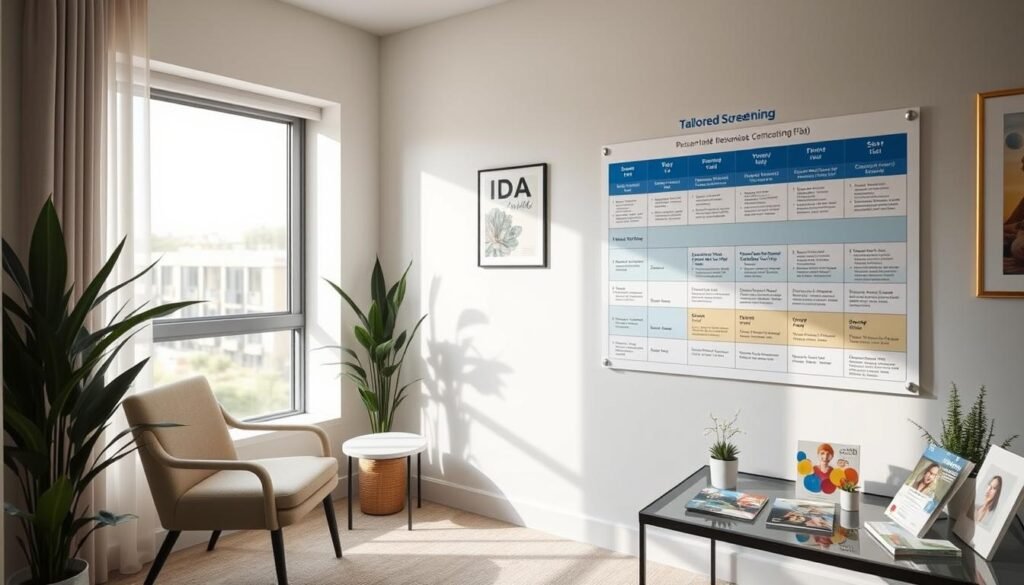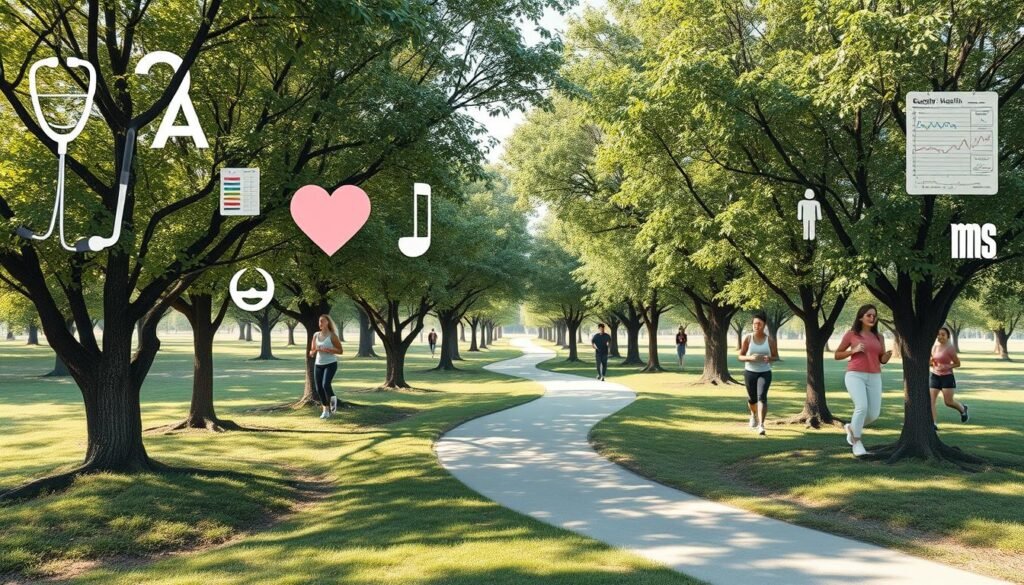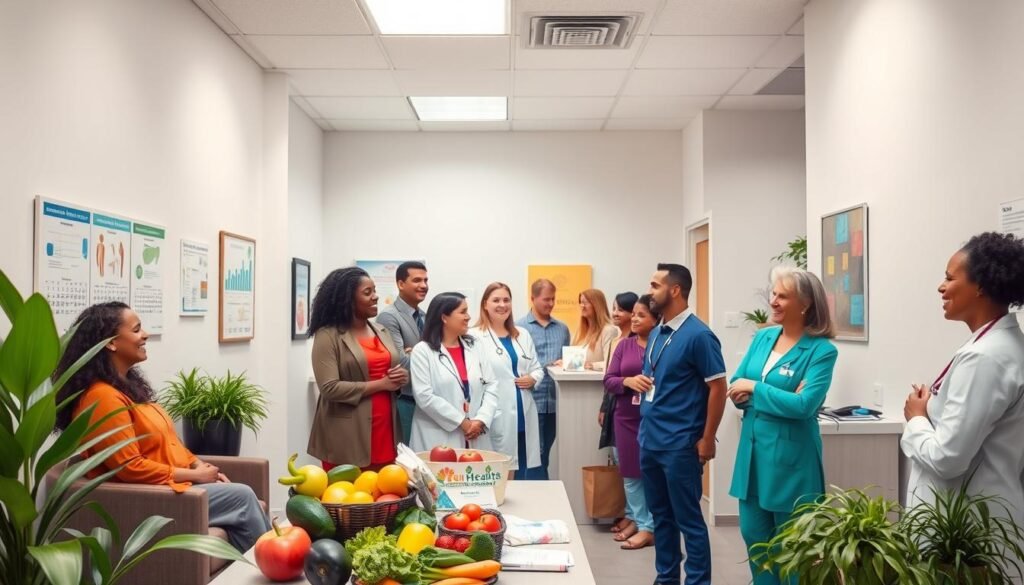Did you know 1 in 8 women in the U.S. will get breast cancer? That’s a big reason to keep up with health check-ups. Regular screenings are key for catching health issues early. This can lead to a better chance at beating diseases. So, getting the right screenings at the right time is a must for keeping healthy.
These days, health care is all about what’s best for you. Your age and risk factors decide which screenings you need. This makes sure you get the most important tests. This article will cover how often you should get checked. It’s all about taking steps to stay healthy.
Key Takeaways
- Regular screenings are vital for early detection of health issues.
- Women aged 40 and older should begin annual mammograms for breast cancer screening.
- Preventive care services are often covered by health plans at no out-of-pocket cost.
- Individuals between ages 25 and 65 should have primary HPV tests done every five years.
- Consultation with healthcare providers is crucial for personalized screening strategies.
- Understanding the importance of timely screenings can save lives.
Introduction to Health Screenings
Health screenings are key in finding health issues early. They are preventive measures which help keep us healthy. By catching problems soon, we can deal with them quicker.
Screenings are a team effort with healthcare providers leading the way. They tell us which tests we need based on our age and health risks. This may include checking blood pressure, testing for cholesterol, and looking for signs of cancer. These steps are crucial for managing our health.
To know more about what screenings you need, visit the recommendations online. It is wise to stay updated on when and how often these tests should be done. This knowledge is crucial for taking charge of your health.
Understanding the Significance of Health Screenings
Health screenings are key to spotting health issues early. They are more than routine checks. They are crucial for early detection. Screenings like those for cholesterol are vital. They can spot risks like high cholesterol early. This helps prevent conditions like cardiovascular disease.
Fecal occult blood tests are suggested from age 50. They look for hidden blood in the stool. This can be a sign of colorectal cancer. Significance of health screenings cannot be overstated.
Experts, like those at Hampton Family Practice, stress these screenings are important. They should be part of everyone’s health routine. Pap smears, for example, are vital for sexually active women under 65. They catch cervical cancer early. PSA tests check for prostate issues in men. This includes cancer and non-cancerous conditions like BPH.
Mammography for breast cancer is advised every 1-2 years after 50. This is backed by groups like the USPSTF. Regular colonoscopies from age 50 are essential for finding colorectal cancer. The American Diabetes Association recommends diabetes screening from age 45. This is especially true for those with additional risk factors.
Keeping up with these screenings can greatly improve well-being. They can not only save lives but also improve life quality. Being aware of health changes leads to timely help. This can improve outcomes.
Regular health screenings help avoid serious health issues. This saves time and resources later on. For more on early warning signs, Care Your Lungs has great information. Early detection is crucial for managing chronic conditions well.
Screening Frequency Recommendations
Getting screenings on time is key for keeping in top health. Checks like cancer screenings help find and treat problems early. We’ll look at how often people of different ages and risks should get screened.
The Importance of Timely Screenings
Screenings are crucial for catching health issues early. For those at high risk, especially smokers aged 50 to 64, it’s advised to get an LDCT lung cancer scan every year. Catching lung cancer early can cut death rates by 20-24%. This could save around 60,000 lives every year in the U.S. Finding cancer early, like breast and cervical cancer, is vital for better health results.
How Early Detection Can Save Lives
Early detection makes treatment easier and more likely to succeed. Women are encouraged to get mammograms yearly starting at 45. Those between 40 and 44 can choose to start early. This is important because cancer affects people differently. For instance, non-Hispanic Black women are more likely to find out they have advanced breast cancer. Regular screenings are crucial for everyone to improve health outcomes.
| Screening Type | Recommended Age Group | Frequency | Notes |
|---|---|---|---|
| Lung Cancer Screening (LDCT) | 50-64 | Yearly | For individuals with a significant smoking history |
| Mammograms | 40-44 | Annual (optional) | Regular screening advisable starting at age 45 |
| Cervical Cancer Screening | 21-65 | Every 3 years | Or every 5 years if combined with HPV testing |
| Prostate Cancer Screening | 45+ | Discuss with a doctor | Recommended for men at higher than average risk |
| Chlamydia and Gonorrhea Screening | 15-65 | Depending on risk factors | Especially for sexually active individuals |
Common Adult Health Screenings: An Overview
Health screenings are key for adults to prevent illness. They help find and manage health problems early. There are many types, including checking blood pressure, cholesterol levels, and cancer screenings. These depend on a person’s age and gender.
Blood Pressure Monitoring
Keeping an eye on blood pressure is important for heart health. Adults should start getting checked at least every 2 years. If their blood pressure is high, they might need checks more often. This helps catch risks for heart issues and stroke early.
Cholesterol and Blood Sugar Tests
Cholesterol tests are important to check heart health. They measure good and bad cholesterol levels. Adults should have these tests every 2 to 5 years, based on their risk. Tests for prediabetes and diabetes are recommended for adults 35 to 75 who are overweight. Finding these issues early can help with better control and changes in lifestyle.
Cancer Screenings by Age and Gender
Cancer screenings depend on a person’s age and gender. Women should start tests for cervical cancer at 21. Both men and women need to start checking for colorectal cancer at 45. Women in their 40s should get mammograms every year. Men should think about tests for prostate cancer in their 50s. These screenings are crucial for early detection and prevention.
Best Practices for Screening Frequency
Adding best practices for screening to your health plan is key. Regular check-ups catch health issues early, leading to better health. It’s smart to follow the recommended schedule for tests.
For adults 45 to 75, screening for colorectal cancer is advised. People between 50 to 75 get the most from regular check-ups. This follows the US Preventive Services Task Force’s grade A guidelines. Adults 45 to 49 should also get screened, with a grade B suggestion. For those 76 to 85, screening might help, especially if they haven’t been screened before.
Here are the recommended screening methods:
- High-sensitivity guaiac fecal occult blood test (HSgFOBT) or fecal immunochemical test (FIT) every year
- Stool DNA-FIT test every 1 to 3 years
- Computed tomography colonography every 5 years
- Flexible sigmoidoscopy every 5 to 10 years, plus FIT every year
- Colonoscopy every 10 years
Cervical cancer screening has its own rules. For those 21-29, a Pap test every 3 years is best. From 30-65, you can choose an HPV test every 5 years or stick with Pap tests every 3 years. Women over 65 need to talk with their doctors about their screening plan, based on their health history. This plan makes sure screenings cover all needs.
It helps to keep track of your health records. Note down every screening and doctor’s advice. This way, you stay on top of your health and make smart choices.
How Often to Screen: Tailoring to Individual Needs
How often you need to screen depends on your health. Everyone is different, so it’s key to make a plan that’s just for you. Things like how old you are, your way of living, and your family’s health history play a big role. Knowing about these can help you make the best choices for your health.
Factors Influencing Screening Intervals
There are several things that help figure out how often you need health checks:
- Age: Depending on your age, you might need certain checks, like colorectal cancer screening starting at 45.
- Family History: If your family has a history of things like heart disease or cancer, you might need screenings more often.
- Lifestyle Factors: If you smoke or don’t eat well, you may need more frequent checks for chronic diseases.
- Existing Health Conditions: Anyone with ongoing health issues might need to be checked more often.
Consultation with Healthcare Professionals
Talking with health experts is key to setting up your own screening plan. They can look at what risks you have and decide how often you need tests. This ensures you follow guidelines and get updates as your health changes. Talking openly about screening frequency helps you take charge of your health.

| Screening Type | Age Group | Frequency |
|---|---|---|
| Colorectal Cancer | 45-75 | Every 10 years (Colonoscopy) |
| Abdominal Aortic Aneurysm | Men 65-75 (smokers) | One-time ultrasound |
| High Blood Pressure | 18 and older | Every 2 years (more often if high-risk) |
| Diabetes (Type 2) | 35-70 (overweight/obese) | Every 3 years |
| Osteoporosis | Women 65+ | Every 2 years or as recommended |
Age-Specific Screening Guidelines
It’s vital to know the right health checks for each stage of life. As we grow, our bodies need different screenings. The types of screenings change from early prevention in youth to in-depth health checks later on.
20s and 30s: Essential Screenings
In your 20s and 30s, it’s about stopping health issues before they start. Key checks should include:
- Annual blood pressure checks
- Cholesterol screening starting at 20 for those at risk
- Dental exams once or twice a year
- Yearly flu shots
- Tests for sexual health and STIs regularly
40s and 50s: Increased Focus on Cancer and Chronic Diseases
Once you hit your 40s and 50s, the focus is on spotting chronic diseases and cancer early. You should get:
- Blood pressure checks at least once a year
- Mammography for women, every 1 to 2 years, starting at 40
- Pap tests for cervical cancer every 3 years for women 30 to 65
- Start colorectal cancer screenings at 45
- PSA tests for men 50 and up, especially those with a family history
60s and Beyond: Comprehensive Health Evaluations
In your 60s and later, thorough health checks become key. Screenings for this age group are:
- Annual flu shots and Tdap vaccines
- Bone density tests for those at risk of osteoporosis
- Eye exams every 1 to 3 years
- Yearly checks for lung cancer in high-risk folks
- Regular checks for signs of skin cancer
Optimal Screening Frequency for Specific Health Risks
Figuring out how often people should get checked for health issues is tricky. It depends on their unique situations. People with ongoing illnesses or genetic risks might need different screening schedules. For instance, if you have relatives with colorectal cancer, your risk goes up. This means you might need special screening plans.
A research piece on HIV testing intervals uncovered something interesting. Normally, people are advised to get tested every few years. But for those who take more risks, testing every year is better. This shows why we must consider someone’s lifestyle and genes to decide how often they need testing. The guidelines even say that if you’re more likely to encounter HIV, you should get tested more often. It points out that not everyone faces the same level of health risks.
When it comes to colorectal cancer, your family history is crucial. If a close family member got diagnosed after turning 50, you might need a test every five years. But if you have two or more relatives with the condition, every three years might be necessary. This shows why customized care is essential in determining the right screening frequency for different health threats.
Women’s preventive healthcare also includes specific tips. They’re advised to have screenings for urinary incontinence every year. And they should start getting breast cancer screenings every two years, beginning when they’re 40 to 50. These focused strategies help women stay ahead in maintaining their health.

Screening Frequency Standards: What to Expect
It’s important to know how often to get health screenings. Guidelines from national health organizations show what screenings you need based on your age and health. These rules help doctors and patients keep up with health tests.
For women, when to get mammograms changes with age. Women 40 to 44 can choose to start yearly mammograms. From 45 to 54, it’s important to get one every year. After 55, women can have them every other year or keep doing it yearly. High-risk women should get a breast MRI and a mammogram every year starting at 30.
Women 18 to 39 should check their blood pressure every 3 to 5 years. Those at more risk might need checks more often. Cervical cancer screenings begin at 21, with Pap tests advised every three years until 29. Start checking cholesterol at 45, unless you have risk factors, then start at 20.
Start colorectal cancer screenings at 45. After a negative Cologuard test, check again in three years. Screening people 45 to 49 can help reduce deaths from colorectal cancer.
These standards are key for staying ahead in your health. Taking steps early can lead to finding issues sooner and better health later on.
Benefits of Staying Proactive with Your Health
Being proactive with health screenings helps people control their health. Benefits of proactive health screening are many. They help find health issues early and understand health risks. Through regular screenings, individuals learn about their physical health. This knowledge leads to making choices for a healthier life.
Understanding Health Risks Early On
Early identification of health risks greatly improves management. A statistic shows that 86.5% of people eligible got screened. Early screenings detect conditions like hypertension and diabetes. Detecting diseases early increases chances of successful treatment, especially for severe illnesses.
Making Informed Health Decisions
Knowledge from screenings helps people make informed health decisions. Blood tests provide crucial data on cholesterol and glucose levels. Tests like X-rays and MRIs find tumors or fractures. Including family history and lifestyle in risk assessments helps individuals. They can prevent illness and make important lifestyle adjustments.

| Screening Type | Health Insights Gained |
|---|---|
| Blood Tests | Cholesterol levels, blood glucose, liver and kidney function |
| Imaging Tests | Detection of tumors, fractures, and organ anomalies |
| Physical Examinations | High blood pressure, heart murmurs, respiratory issues |
| Cancer Screenings | Early detection of breast, cervical, and colorectal cancers |
Proactive health screening not only boosts health but also cuts healthcare costs. It does so by enabling early treatment. By getting screened and consulting with doctors, people work towards a healthier future. Starting with understanding health risks and making good decisions leads to a longer, joyful life.
Conclusion
It’s crucial to follow screening frequency advice to stay healthy. Regular screenings are key for finding diseases early. Acting early leads to better health outcomes by focusing on prevention and care.
Adjusting screening schedules for individual needs is essential. The American Cancer Society’s guidelines on cancer screenings show how vital updates are. Screenings not only help you, but they also help public health by fighting disparities and fostering positive changes.
Choosing wisely about healthcare improves life quality. Making time for regular check-ups is a critical part of staying healthy. We encourage everyone to talk to their doctors about which screenings are right for them.